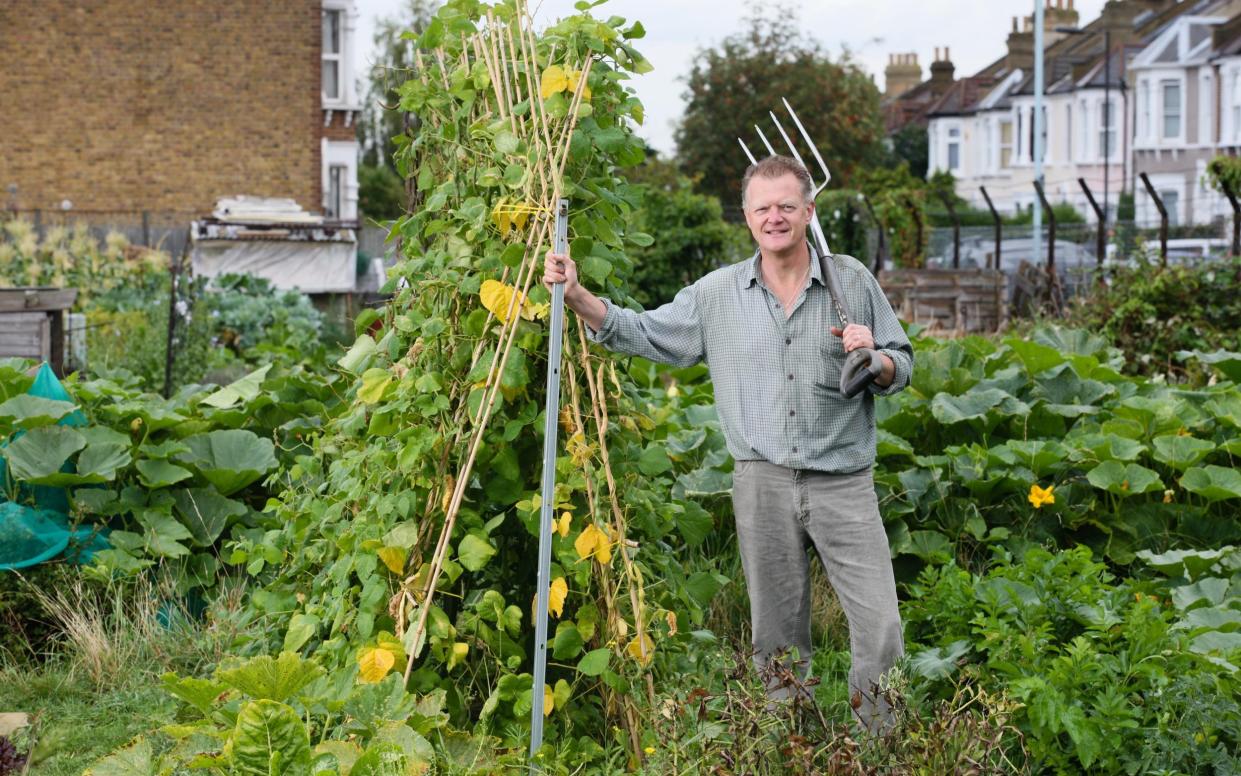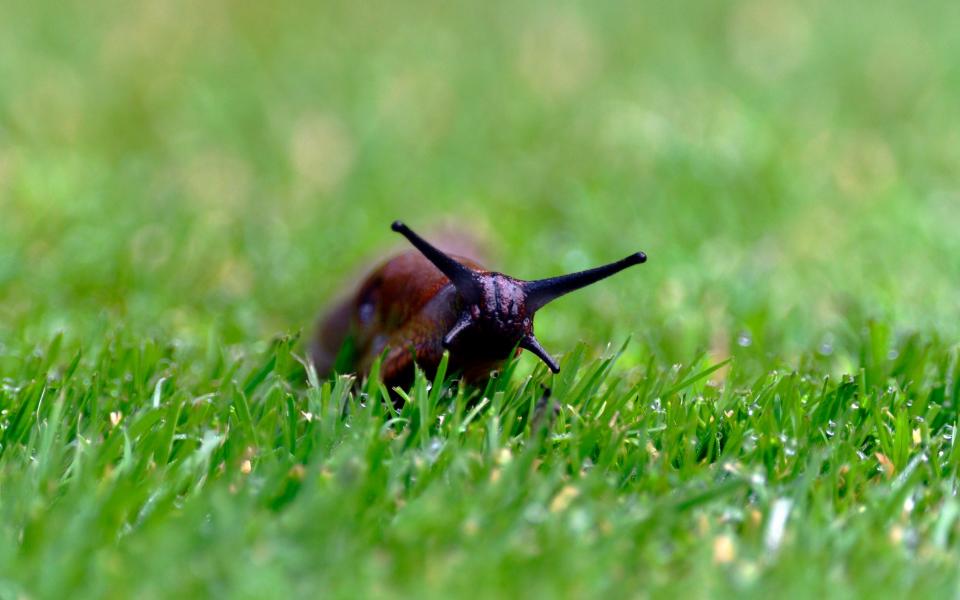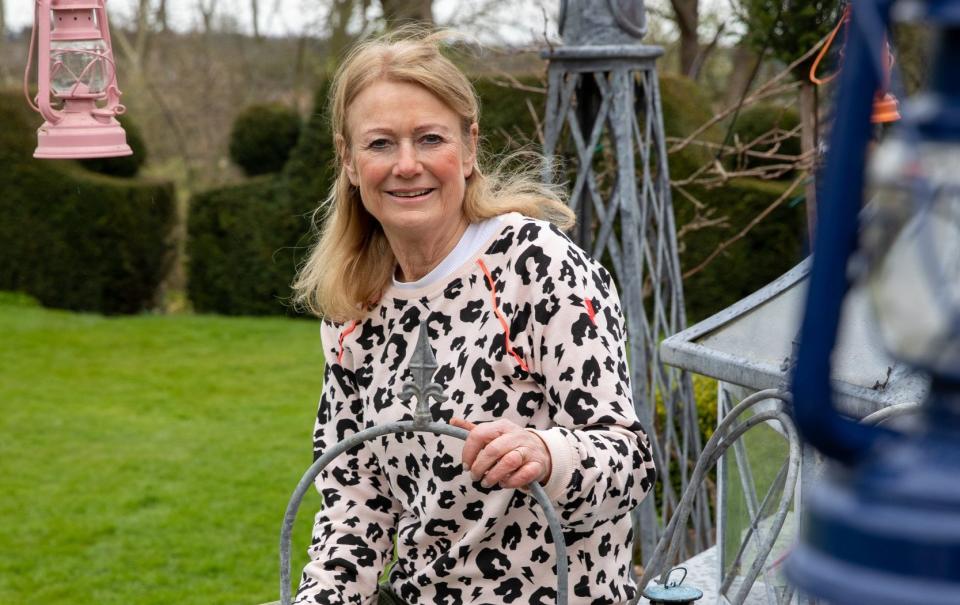Should you hug a slug? The new culture war dividing gardeners

Anyone who has encountered a gastropod – snails or slugs – under barefoot at night will be familiar with the horror: a wet, squelching sensation that leaves you feeling both revolted... and a bit relieved. Another garden predator has bitten the dust, and with that, your cabbages, hostas and you can sleep a little more safely.
Until now, few would have felt guilty. Yet, according to the Royal Horticultural Society (RHS), that’s exactly what we should be experiencing. Barely four weeks ago, the RHS decreed that slugs and snails should not be classified as pests, but welcomed instead as “garden visitors”.
The news came hard on the heels of Government action to ban the most commonly used slug pellets, which contain the chemical metaldehyde – which essentially dehydrates slugs to death – in favour of less toxic alternatives, such as those that contain ferric phosphate – especially organic ones.
Perhaps inevitably, some local allotment groups couldn’t resist going further still, with Hazelbank Allotment Association in south London, promptly banning all pellets – organic or not.
In an echo of the health and safety madness of the 1990s, the association said: “Go out at night with a torch and collect all the snails and slugs you can find in a bucket… Then relocate them.”
It goes on: “Slugs and snails like to hide in dark places. Put a piece of damp cardboard in the garden, hold down with a rock and you can then venture out and check it regularly and collect and remove any of the slugs that have congregated there.” Pick of the bunch for sheer labour-intensiveness is the recommended deployment of eggshells, over which slugs find it confoundedly tricky to make progress. Any takers?
While natural gardeners – who presumably never walk outside at night in bare feet – are cheering, not everyone is delighted. Indeed, the sanctification of nature’s slimiest customer seems to highlight a growing divide between two distinct garden and allotment tribes; two types of plantsman.

On the one side are the ‘ecos’, the slug huggers, for whom nothing short of 100 per cent natural will do. No pellets, no pesticides. Facing off against them, often just over the fence, are the traditionalists – people who want to actually grow and eat things and are happy to use any chemical, within reason, to do so.
The animosity echoes the popular BBC series Allotment Wars, which delighted in exploring the seething tensions amid the leafy rows, sheds and beanstalks of Britain’s vegetable plots.
Now things are much worse, with some allotment associations banning all slug pellets, dividing opinions and options among plot holders.
Joanna Fortnam, Daily Telegraph gardening editor, is only too aware of the rancour that prevails and gives the hitherto gentlest of pursuits all the publicity it doesn’t need. “Obviously, I get to hear a bit about ructions across the allotment community,” she says. “It doesn’t greatly surprise me, although the unrest is a cause for sadness. The old ways and the new are not always compatible – although personally I think we can all learn from each other in gardening, that’s partly the point of it.”
It’s not just about sensitivity to slugs or chemicals, of course. Matthew Appleby, editor of Horticulture Week, points to the greater variety of tenants drawn to allotments during lockdown. Certainly, the National Allotment Society (NAS) says that 40 per cent of English councils reported a “significant uplift” in applications to join waiting lists during April 2020, with a 300 per cent increase in one case – Hyndburn in Lancashire.
What do slugs and snails hate? Egg shells? Wool pellets? We're starting scientific trials of home remedies used by gardeners to deter pests. Read more about the study here: https://t.co/wfkgp31jNw @hayleyento
— The RHS (@The_RHS) June 5, 2018
“Today there’s a broader range of people, so a broader range of thinking,” Appleby says, “and with that, more difference of opinion. Anecdotal evidence shows allotments have been subject to social and demographic change.”
The ascent to power of allotment association committees, as a rising number of councils has abrogated responsibility for sites, has also played a part. “People tend to accept decisions made by the council,” he explains. “But if it’s an allotment committee, you have more of a stake in it, and you want more of a say.”
Back to slugs – and it has to be asked, why the change of fortune for an insatiable predator we have long loved to hate?
Andrew Salisbury, principal entomologist at the RHS, believes slugs are misunderstood. “It’s high time we started to better understand them,” Salisbury implores, “and the many other garden visitors that have been branded persona non grata, and the important role they all play in planet-friendly gardening and maintaining a healthy ecosystem.”
Slugs have a particular role to play in waste management. Gardening expert Carol Klein explains: “If we didn’t have slugs and snails we would all be knee-deep in debris and rubbish because that is what they do: they chomp through it.”
Plus, gardeners need to stop thinking of all slugs as night-time menaces. Of the 44 species we know about, Salisbury adds, only nine are likely to be busily gorging on our beloved brassicas and the rest.
On the other side of the slugfest, Caleb Benjamin, whose cultivating skills were honed in 1960s Jamaica, is among the disenchanted. “We must rise up,” Benjamin says from his plot, in Catford, south east London. “There are people being killed around the world and we are talking about protecting a soulless slug.”
Bunny Guinness, a regular panelist on BBC Radio 4’s Gardener’s Question Time with her own YouTube channel, remains an unrepentant slug controller. “I do like slugs,” she says, “in the right place. I just don’t want them eating my lettuce.”
She uses coffee grounds and copper tape as deterrents, but does not baulk at the “crushing” method. “I stand on them,” she says. “Which I know isn’t very humane, but I do have woodland nearby where they can roam free.”
She also backs the use of ferric phosphate pellets – as recommended by the Government instead of metaldehyde, because they are less harmful to other wildlife. Still, she says, “They’re very good at the job of killing slugs.”
Disturbingly, but of little surprise to many, the outbreak of hug-a-slug correctness and compassion seems to have brought some allotment associations out in an extended rash of energetic rule-making on other issues.

Appleby says: “There is a hell of a lot of self-management going on and there are many reports of allotments getting out of control – a few people making up lots of regulations. When the council is in charge, it tends to be a bit more sane.”
Some association committees, he says, have even insisted that all sheds are painted the same colour and that the number of vegetables grown per plot be fixed.
“In Merton, south west London, where I have a plot,” he adds, “the association wanted to build a £50,000 fence to keep out human intruders. It was an overly grandiose scheme and there was a revolt, so eventually it was parked. Very often it’s the birds stealing your fruit and veg. People tend to look for more sinister suspects.”
He adds: “It is often forgotten that allotments are not just community spaces but sometimes somewhere you go for a bit of solace, where you can be alone. People don’t want to be managed.”
As for those pesky ‘garden visitors’, there is at least a crumb of comforting sympathy for beleaguered tenants from Phil Gomersall, the Leeds-based president of the National Allotment Society. “The ban is a shame because slug pellets are the only effective way of getting rid of them,” he says. “I suppose I could use beer trays, but I like my beer too much.”


